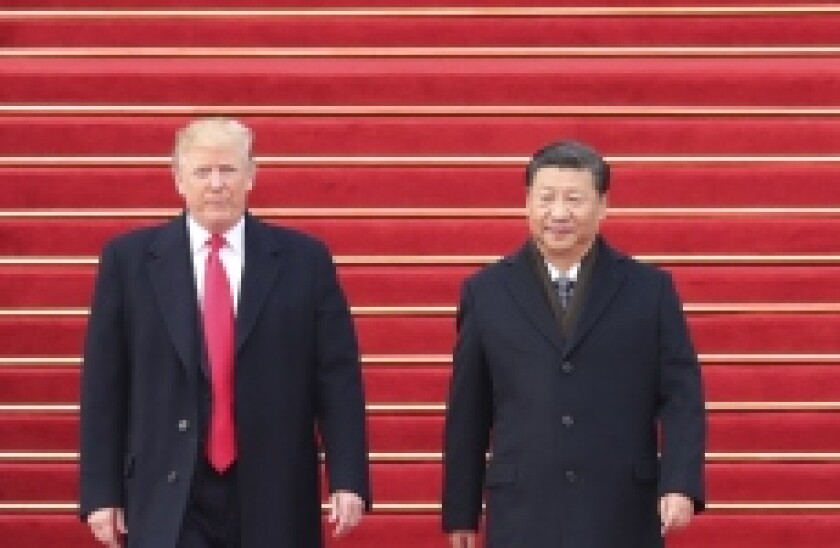Chinese vice-premier Liu He flew to Washington DC on Wednesday to begin the ninth round of trade talks between the US and China.
Ahead of Liu’s visit, the Tariffs Division under China’s Ministry of Finance said it would keep suspending the retaliatory tariffs on US cars.
Meanwhile, China's National Narcotics Control Commission said on April 1 that it would add fentanyl to its list of controlled substances. That means Chinese producers cannot export fentanyl products to the US, something that US president Donald Trump had long been a critic of.
During the talks, Bloomberg reported that as part of the deal, China will buy more US commodities including soybeans and energy products and will allow companies that are 100% foreign-owned to operate in China, citing people familiar with the negotiations. The deal will also include certain deadlines for China to fulfill its pledges by.
While Liu was in the US, Chinese government officials back in Beijing were publicly naming and shaming local officials for disadvantaging foreign companies.
The National Audit Office criticised 45 local governments for levying unauthorised fees and delaying foreign businesses’ licences.
On Wednesday, the State Council also amended and passed four laws – the Administrative Licensing Law, the Trademark Law, the Construction Law, and the Electronic Signature Law – to supplement the foreign investment law, which was passed during the Two Sessions meeting in March.
Trump met Liu He in the Oval Office on Thursday. After the talks, Trump told reporters that it was a “massive” and “comprehensive” deal that has “got a very, very good chance of happening.” Trump added that “some of the toughest things have been agreed to” and that “the relationship with China is very strong, probably the strongest it’s ever been.”
Meanwhile, the White House said on Friday that “significant work remains, and the principals, deputy ministers, and delegation members will be in continuous contact to resolve outstanding issues.”
Trump also said that a deal will be reached in the next four weeks and that both sides will need two more weeks to put it onto paper.
*
In March, China’s foreign reserves climbed $8.6bn from February to $3.1tr, according to data published by the State Administration of Foreign Exchange (Safe) on Sunday
Wang Chunying, Safe’s spokesperson, attributed the increase to dollar appreciation and rising financial assets prices as a result of the developments on trade talks, changes in monetary policy at European and US central banks, and Brexit.
Wang further said that with the renminbi’s currency rate becoming more “resilient”, the currency exchange rate has gradually become an “automatic stabiliser” for its FX reserves.
*
After the National Bureau of Statistics released the official PMI numbers last week, index provider Caixin released its own services PMI. The numbers confirmed the jump indicated in the official data. It reported a PMI increase from 51.1 in February to 54.4 in March, the highest figure since January 2018.
Its new business sub-index went up by three percentage point to 53.8 while the new export orders sub-index also recovered from January and February.
“We expect the services sector to continue to show signs of recovery in the upcoming months, as fiscal policy easing provides more support for the private sector,” Jingyang Chen, China economist at HSBC wrote on Wednesday.
“Today’s data suggests that growth momentum in the services sector is picking up on the back of recovering domestic demand,” she added. “We expect to see more signs of recovery as fiscal easing starts to kick in, targeting primarily the private sector. This should further support economic activity and boost business confidence.”
*
The People's Bank of China has asked the police to investigate a social media rumor that it had cut the reserve requirement ratio. China's central bank filed the official request on Tuesday, local media reported.
*
China Investment Corporation (CIC) has appointed Peng Chun, former chairman of the Bank of Communications as its new chair. The post had been vacant for more than two years.
CIC manages some of the investments of China’s FX reserves and is the world’s second largest wealth management fund by assets, according to local media company Caixin.
*
Shanghai Stock Exchange (SSE) confirmed on Thursday the members of the IPO approval committee for its Technology and Innovation Board, its technology and innovation consulting committee, and public offering self-regulatory commission.
So far, a total of 50 companies have received the initial green light from the first stage of the approval process, meaning they have submitted all required documents. Among those, nine have entered the phase of inquiries, in which SSE raises enquiries on the application material.

